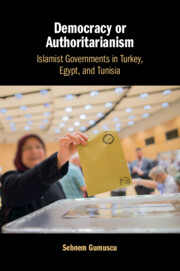Book contents
- Democracy or Authoritarianism
- Democracy or Authoritarianism
- Copyright page
- Contents
- Figures
- Acknowledgments
- Abbreviations
- Introduction
- 1 Modernization, Inclusion, and Power
- 2 A Theory of Intraparty Politics
- 3 The AKP’s Pivot from Liberal Democracy to Electoral Islamism
- 4 Electoral Islamism and Killing the Dream of a Democratic Muslim Brotherhood
- 5 Ennahda’s Path toward Liberal Islamism
- Conclusion
- Interviews
- Bibliography
- Index
Conclusion
Published online by Cambridge University Press: 09 March 2023
- Democracy or Authoritarianism
- Democracy or Authoritarianism
- Copyright page
- Contents
- Figures
- Acknowledgments
- Abbreviations
- Introduction
- 1 Modernization, Inclusion, and Power
- 2 A Theory of Intraparty Politics
- 3 The AKP’s Pivot from Liberal Democracy to Electoral Islamism
- 4 Electoral Islamism and Killing the Dream of a Democratic Muslim Brotherhood
- 5 Ennahda’s Path toward Liberal Islamism
- Conclusion
- Interviews
- Bibliography
- Index
Summary
This chapter synthesizes the similarities and differences among three Islamist parties – the AKP, the Muslim Brotherhood, and Ennahda – in power and shows how internal dynamics matter more in charting their democratic commitments than do external forces. The chapter then assesses how far this theory travels to other cases of Islamist parties and regimes like Iran and discusses the implications of these findings for the relationship among Islam, Islamism, and democracy. The chapter concludes with a brief discussion of the rise of right-wing populism elsewhere in the world and the role of party capture in fueling such authoritarian trends.
- Type
- Chapter
- Information
- Democracy or AuthoritarianismIslamist Governments in Turkey, Egypt, and Tunisia, pp. 255 - 266Publisher: Cambridge University PressPrint publication year: 2023

